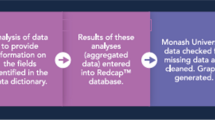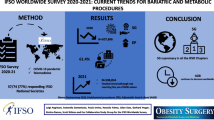Abstract
Purpose
The aim of this study is to demonstrate the importance of considering Cushing’s syndrome (CS) as a potential etiology for weight gain and metabolic complications in patients undergoing bariatric surgery (BS).
Design and Methods
This is a retrospective chart review case series of patients (n = 16) with CS from five tertiary care centers in the USA who had BS.
Results
Median age at BS surgery was 35.5 years (median 2.5 years between BS and CS surgery). CS was not identified in 12 patients prior to BS. Four patients had CS surgery prior to BS, without recognition of recurrent or persistent CS until after BS. Median body mass index (BMI) values before BS, nadir after BS, prior to surgery for CS, and after surgery for CS were 47, 31, 38, and 35 kg/m2, respectively. Prior to BS, 55 % of patients had hypertension and 55 % had diabetes mellitus. Only 17 % had resolution of hypertension or diabetes mellitus after BS.
Conclusion
CS may be under-recognized in patients undergoing BS. Testing for CS should be performed prior to BS in patients with features of CS and in post-operative BS patients with persistent hypertension, diabetes mellitus, or excessive weight regain. Studies should be conducted to determine the role of prospective testing for CS in subjects considering BS.




Similar content being viewed by others
References
Flegal KM, Carroll MD, Kit BK, et al. Prevalence of obesity and trends in the distribution of body mass index among US adults, 1999–2010. JAMA. 2012;307(5):491–7.
Valassi E, Santos A, Yaneva M, et al. The European Registry on Cushing’s syndrome: 2-year experience. Baseline demographic and clinical characteristics. Eur J Endocrinol. 2011;165(3):383–92.
Zeiger MA, Fraker DL, Pass HI, et al. Effective reversibility of the signs and symptoms of hypercortisolism by bilateral adrenalectomy. Surgery. 1993;114(6):1138–43.
Estimate of bariatric surgery numbers [Internet]. Available from: http://asmbs.org/2014/03/estimate-of-bariatric-surgery-numbers/.
Nieman LK, Biller BM, Findling JW, et al. The diagnosis of Cushing’s syndrome: an Endocrine Society clinical practice guideline. J Clin Endocrinol Metab. 2008;93(5):1526–40.
Clinical guidelines on the identification, evaluation, and treatment of overweight and obesity in adults—the evidence report. National Institutes of Health. Obes Res. 1998;6 Suppl 2:51S—209S. http://www.nhlbi.nih.gov/files/docs/guidelines/ob_gdlns.pdf.
Mechanick JI, Youdim A, Jones DB, et al. Clinical practice guidelines for the perioperative nutritional, metabolic, and nonsurgical support of the bariatric surgery patient–2013 update: cosponsored by American Association of Clinical Endocrinologists, The Obesity Society, and American Society for Metabolic & Bariatric Surgery. Surg Obes Relat Dis. 2013;9(2):159–91.
Jensen MD, Ryan DH, Apovian CM, et al. 2013 AHA/ACC/TOS guideline for the management of overweight and obesity in adults: a report of the American College of Cardiology/American Heart Association Task Force on Practice Guidelines and The Obesity Society. Circulation. 2014;129(suppl 2):S102–S138.
Fleseriu M, Ludlam WH, Teh SH, et al. Cushing’s syndrome might be underappreciated in patients seeking bariatric surgery: a plea for screening. Surg Obes Relat Dis. 2009;5(1):116–9.
Buchwald H, Avidor Y, Braunwald E, et al. Bariatric surgery: a systematic review and meta-analysis. JAMA. 2004;292(14):1724–37.
Tiryakioglu O, Ugurlu S, Yalin S, et al. Screening for Cushing’s syndrome in obese patients. Clinics (Sao Paulo). 2010;65(1):9–13.
Ness-Abramof R, Nabriski D, Apovian CM, et al. Overnight dexamethasone suppression test: a reliable screen for Cushing’s syndrome in the obese. Obes Res. 2002;10(12):1217–21.
Leibowitz G, Tsur A, Chayen SD, et al. Pre-clinical Cushing’s syndrome: an unexpected frequent cause of poor glycaemic control in obese diabetic patients. Clin Endocrinol (Oxf). 1996;44(6):717–22.
Catargi B, Rigalleau V, Poussin A, et al. Occult Cushing’s syndrome in type-2 diabetes. J Clin Endocrinol Metab. 2003;88(12):5808–13.
Reimondo G, Pia A, Allasino B, et al. Screening of Cushing’s syndrome in adult patients with newly diagnosed diabetes mellitus. Clin Endocrinol (Oxf). 2007;67(2):225–9.
Terzolo M, Reimondo G, Chiodini I, et al. Screening of Cushing’s syndrome in outpatients with type 2 diabetes: results of a prospective multicentric study in Italy. J Clin Endocrinol Metab. 2012;97(10):3467–75.
Baid SK, Rubino D, Sinaii N, et al. Specificity of screening tests for Cushing’s syndrome in an overweight and obese population. J Clin Endocrinol Metab. 2009;94(10):3857–64.
Magro DO, Geloneze B, Delfini R, et al. Long-term weight regain after gastric bypass: a 5-year prospective study. Obes Surg. 2008;18(6):648–51.
Nunes ML, Vattaut S, Corcuff JB, et al. Late-night salivary cortisol for diagnosis of overt and subclinical Cushing’s syndrome in hospitalized and ambulatory patients. J Clin Endocrinol Metab. 2009;94(2):456–62.
Petersenn S, Newell-Price J, Findling JW, et al. High variability in Baseline urinary free cortisol values in patients with Cushing’s disease. Clin Endocrinol (Oxf). 2014;80(2):261–9.
Feelders RA, Pulgar SJ, Kempel A, et al. The burden of Cushing’s disease: clinical and health-related quality of life aspects. Eur J Endocrinol. 2012;167(3):311–26.
Etxabe J, Vazquez JA. Morbidity and mortality in Cushing’s disease: an epidemiological approach. Clin Endocrinol (Oxf). 1994;40(4):479–84.
Lindholm J, Juul S, Jorgensen JO, et al. Incidence and late prognosis of Cushing’s syndrome: a population-based study. J Clin Endocrinol Metab. 2001;86(1):117–23.
Swearingen B, Biller BM, Barker 2nd FG, et al. Long-term mortality after transsphenoidal surgery for Cushing disease. Ann Intern Med. 1999;130(10):821–4.
Acknowledgments
JF conceived the study. BJ developed the chart review questionnaire which was reviewed and agreed upon by all study sites. Institutional review board approval was obtained at each institution. BJ and TC analyzed the data. BJ wrote the paper with assistance from all authors who had final approval of the submitted manuscript.
Conflict of Interest
There are no disclosures related specifically to this report. BJ reports no conflict of interest. TC reports personal fees from Corcept Therapeutics. NT has consulted for Pfizer and Corcept Therapeutics and has received grant support from Ipsen and Pfizer. RS reports grants and personal fees from Novartis, grants and personal fees from Ipsen, and grants and personal fees from Pfizer. AH reports no conflict of interest. MF reports grants and personal fees from Novartis, grants and personal fees from Ipsen, and grants from Corcept Therapeutics. BB reports grants and personal fees from Novartis, personal fees from HRA Pharma, and grants from Cortendo and Corcept Therapeutics. JF reports personal fees from Corcept Therapeutics and Novartis.
Ethical Approval
Institutional review board approval for this retrospective study was obtained at each institution. For this type of study, formal consent is not required.
Informed Consent
Informed consent for this article does not apply.
Author information
Authors and Affiliations
Corresponding author
Rights and permissions
About this article
Cite this article
Javorsky, B.R., Carroll, T.B., Tritos, N.A. et al. Discovery of Cushing’s Syndrome After Bariatric Surgery: Multicenter Series of 16 Patients. OBES SURG 25, 2306–2313 (2015). https://doi.org/10.1007/s11695-015-1681-z
Published:
Issue Date:
DOI: https://doi.org/10.1007/s11695-015-1681-z




